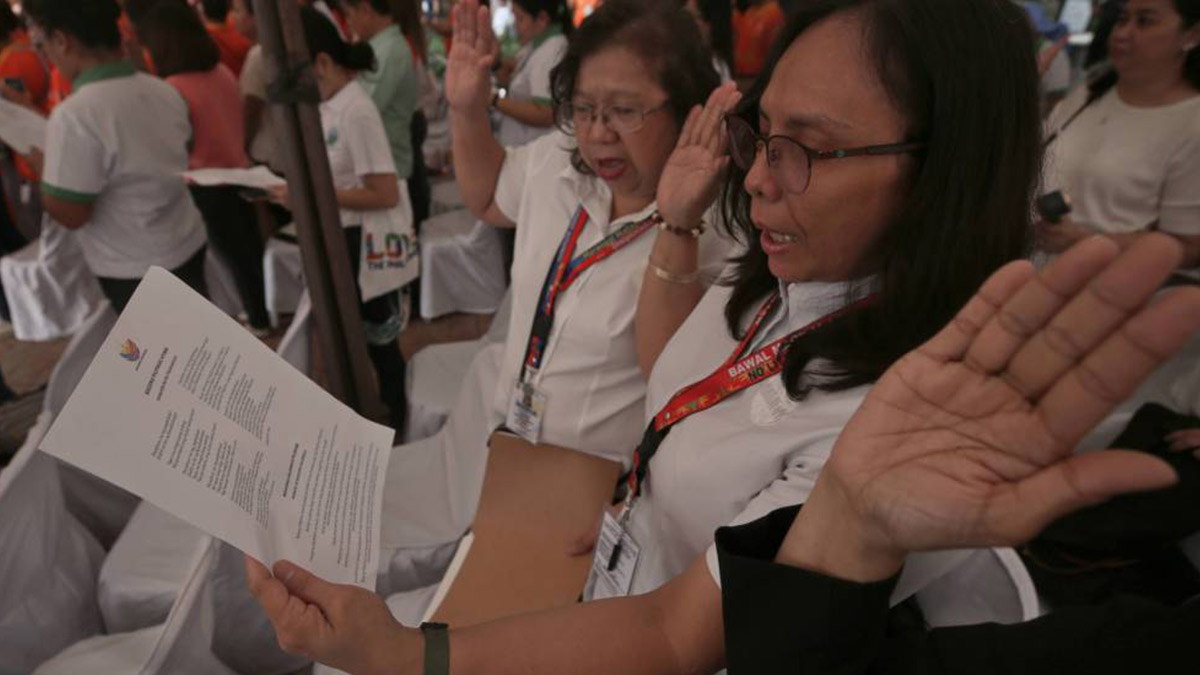‘Bagong Pilipinas’ oaths outside flag law—critics

VOW FOR A BETTER COUNTRY Government workers recite the “Bagong Pilipinas Pledge” after singing the national anthem during the opening ceremony of “Pampamahalaang Programa at Serbisyo,” a service caravan, at Rizal Park in Manila on Monday as part of the country’s 126th Independence Day celebration. —Richard A. Reyes
MANILA, Philippines — The “Bagong Pilipinas” (New Philippines) hymn and pledge, as ordered by President Ferdinand Marcos Jr., are beyond what is mandated by the Flag Law and would only consume more time that will otherwise be better spent holding classes, according to critics, including several teachers’ groups.
The Alliance of Concerned Teachers, the Congress Teachers/Educators for Nationalism and Democracy (Contend) and the Teachers’ Dignity Coalition (TDC) said they were opposing Marcos’ order for government agencies and public schools to sing and recite the hymn and pledge, which are based on his governance branding.
In a statement on Monday, Contend questioned the legality of the President’s Memorandum Circular No. 52, saying this violates Republic Act No. 8491, or the Flag and Heraldic Code of the Philippines.
READ: Marcos’ order: Use Bagong Pilipinas hymn, pledge in flag ceremonies
The group cited the legal arguments raised by former Far Eastern University law school dean Mel Sta. Maria, who said the Flag Law did not give the Office of the President any authority to create or add a hymn or pledge in flag ceremonies.
Article continues after this advertisementIn his post on X (formerly known as Twitter), Sta. Maria said the law itself already provided an oath of allegiance.
Article continues after this advertisementFor Contend, Marcos’ order is reminiscent of the “Bagong Lipunan” (New Society) theme during the martial law period of his father’s time.
“The introduction of the Bagong Pilipinas hymn and pledge seems to evoke this dark chapter in our history, glorifying an era that brought suffering to countless citizens,” the group said.
“It is imperative that our government prioritizes tangible improvements in the lives of our people over superficial changes that echo a troubling history,” it added.
Time-consuming
Sought for comment, ACT chair Vladimer Quetua explained that flag ceremonies in schools already take at least 45 minutes of school time in the morning.
Quetua, who teaches at a Quezon City public school, said teachers and students would sing or recite the opening prayer, the national anthem, the “Panatang Makabayan” (Patriotic Oath), the school hymn, the Quezon City hymn, the National Capital Region hymn, the “Panunumpa sa Watawat” (Pledge of Allegiance to the Philippine Flag) and the oath for government employees.
Often included in this period were messages and reminders from the principal or any other school official who needed to address the teachers and students.
“Imagine that this is already taking a lot of time, what more with this new policy from the President?” Quetua said in a phone interview. “This will also lead teachers, and especially students, to stand for nearly an hour on open ground,” he added.
‘Amend Flag Law’
Senators had mixed reactions to Marcos’ order.
Senate President Francis Escudero said he was not against Memorandum Circular No. 52, but said, “If they really want to make this formal, the right way is to amend the Flag and Heraldic Code and include it.”
Escudero’s father, the late lawmaker and agriculture minister Salvador Escudero III, was the principal author of the Flag Law, which was enacted in 1998.
The Senate leader also noted that the order only applied to the executive branch. “It does not automatically cover the Senate, the House of Representatives, the Supreme Court and other constitutional commissions,” he said, adding that they are only mandated to follow what is stated under the Flag Law.
Senate Minority Leader Aquilino Pimentel III agreed with Escudero that the memorandum circular “is not sufficient. I believe a law is needed in order to authorize that.”
Sen. JV Ejercito said the national anthem and the oaths under the Flag Law were “more than enough to instill nationalism and love of country.” —with a report from Tina G. Santos